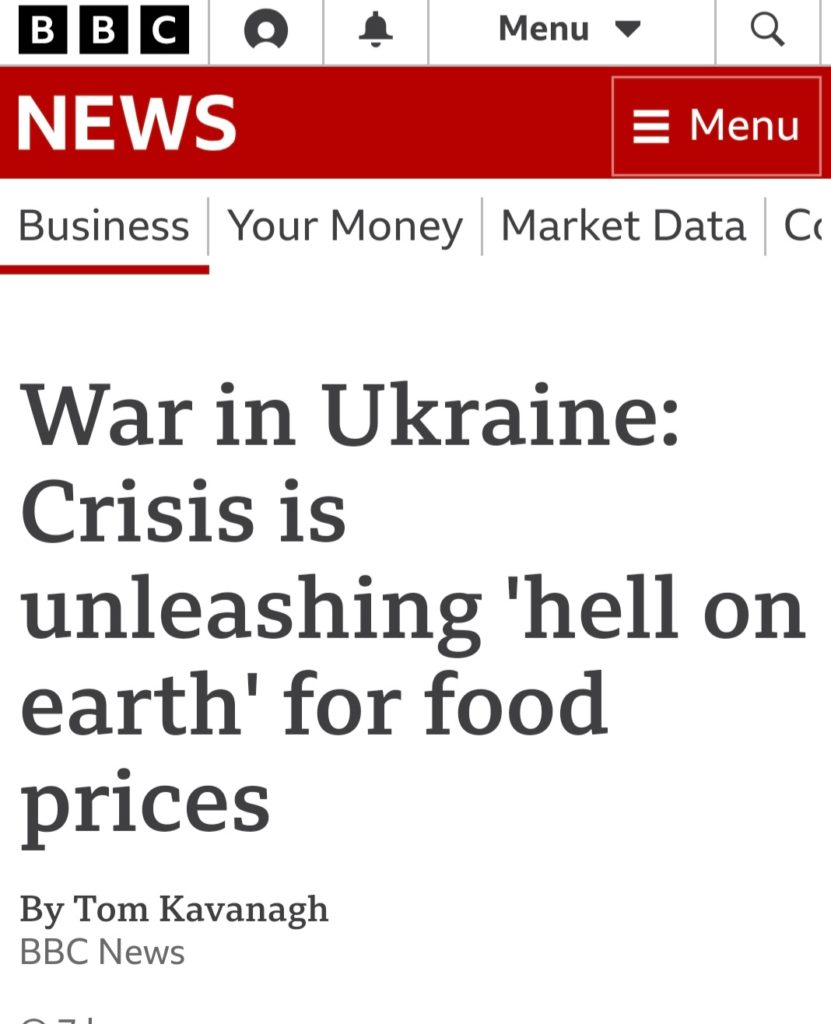By John Pickard
In one of the best presentations we have had at Left Horizons Zoom meetings, Marxist economist, Michael Roberts graphically described the dire economic fallout that will follow the war in Ukraine.
The Covid pandemic had already had a devastating effect on world trade and GDP, an economic collapse from which supply lines, trade and production have not recovered. Now on top of this, as Michael explained, we have the war in Ukraine.
Michael pointed out that Ukraine previously supplied 12 per cent of the world’s wheat exports, 16 per cent of maize and 40 per cent of sunflower oil and taken with the inability of Russia to export wheat and agricultural produce, it means that food prices everywhere will rocket, as will energy prices. “But it is particularly dangerous”, he added, “in countries like Egypt where 105mn people live in a country that is the largest importer of wheat in the world.”

Michael also dealt to some degree with the nature of imperialism, the (relative) decline of the US as a world power, and the relative decline of the dollar in relation to other currencies. The prognosis for the future is one of even greater geopolitical tension and flashpoints, alongside social crises brought about by a global squeeze on living standards.
Prognosis vindicated by IMF World Economic Outlook
The meeting and discussion are well worth watching if you weren’t at the meeting. And even if you were, the charts and information produced by Michael are a valuable resource in any discussion or analysis of world events. The video is available on the Left Horizons YouTube channel, here, or by following the link below.
As it happens, the prognosis put forward by Michael Roberts was vindicated within days, with the publication of the World Economic Outlook of the International Monetary Fund. To quote from the executive summary of the IMF report, “Economic damage from the conflict will contribute to a significant slowdown in global growth in 2022.
“A severe double-digit drop in GDP for Ukraine and a large contraction in Russia are more than likely, along with worldwide spill-overs through commodity markets, trade, and financial channels. Even as the war reduces growth, it will add to inflation. Fuel and food prices have increased rapidly, with vulnerable populations—particularly in low-income countries— most affected”.
An interesting side section hidden in the report highlighted the different futures being faced by the overwhelming majority of society and the super-rich who have more wealth with each month that passes. The IMF report points at what it describes as a “savings glut of the rich”, particularly in the United States. “This phenomenon”, the report says, “has coincided with rising household indebtedness concentrated among lower-income households and rising income inequality,” but adding that the phenomenon, “may not be limited to the United States.”
As an article in the Financial Times explained, “one sign of the trend can be found in the 2022 Wealth Inequality Index report: not only have the richest 1 per cent across the world apparently taken 38 per cent of all wealth gains since the mid-1990s, but also the private share of national wealth has soared, while public wealth has shrunk”.
When your only function in life is to spend money
A relatively new feature in the ‘management’ of super-wealth is the proliferation of so-called ‘family offices’ – firms who manage the vast funds of super-rich individuals and families on their behalf, naturally in such a way as to maximise their wealth.

In 2019, as the Financial Times explained, “there were 7,300-odd family offices in the world, controlling $6tn in funds, a 38 per cent increase from 2017. Between 2020 and 2021, during the latest wave of QE, funds under management increased on average by 61 per cent”. The super-wealthy clearly don’t do any ‘work’ for their money, someone else does that for them…their only function in life is to spend it, although they have so much wealth that their spending can’t keep up with their accumulation.
While the overwhelming majority of society are on an ever-speeding treadmill, desperately trying to make ends meet and therefore unable to save, the super-wealthy have so much money that they literally do not know what to do with it all. So their wealth simply accumulates in a ‘savings glut’. Nothing better illustrates that we live in society in a complete blind alley, an economic system that has long-since outlived any historical justification it ever had.
As an aside, the FT also notes that this week “the Kyiv government embarked on a novel financing step: it launched a website #buymeafighterjet (above) to crowdsource donations for jets from the world’s mega-rich”. It is tempting to think that while ordinary Ukrainian workers do the fighting and suffer the casualties – on behalf of Ukrainian billionaires – that other billionaires are buying weapons to help them do it.
But in fact, the website is not specifically aimed at the uber-rich and it seems it will take ‘donations’ of any size. It looks, in other words, like yet another means to get workers – perhaps Ukrainians in exile or sympathisers – to come up with the money that Ukrainian oligarchs won’t come up with.
The huge and growing disparity of wealth and income, as Michael Roberts explained, is a significant feature of the social malaise that is affecting capitalism. A huge amount of dry, combustible social ‘tinder’ is piling up and it will only need a spark…



